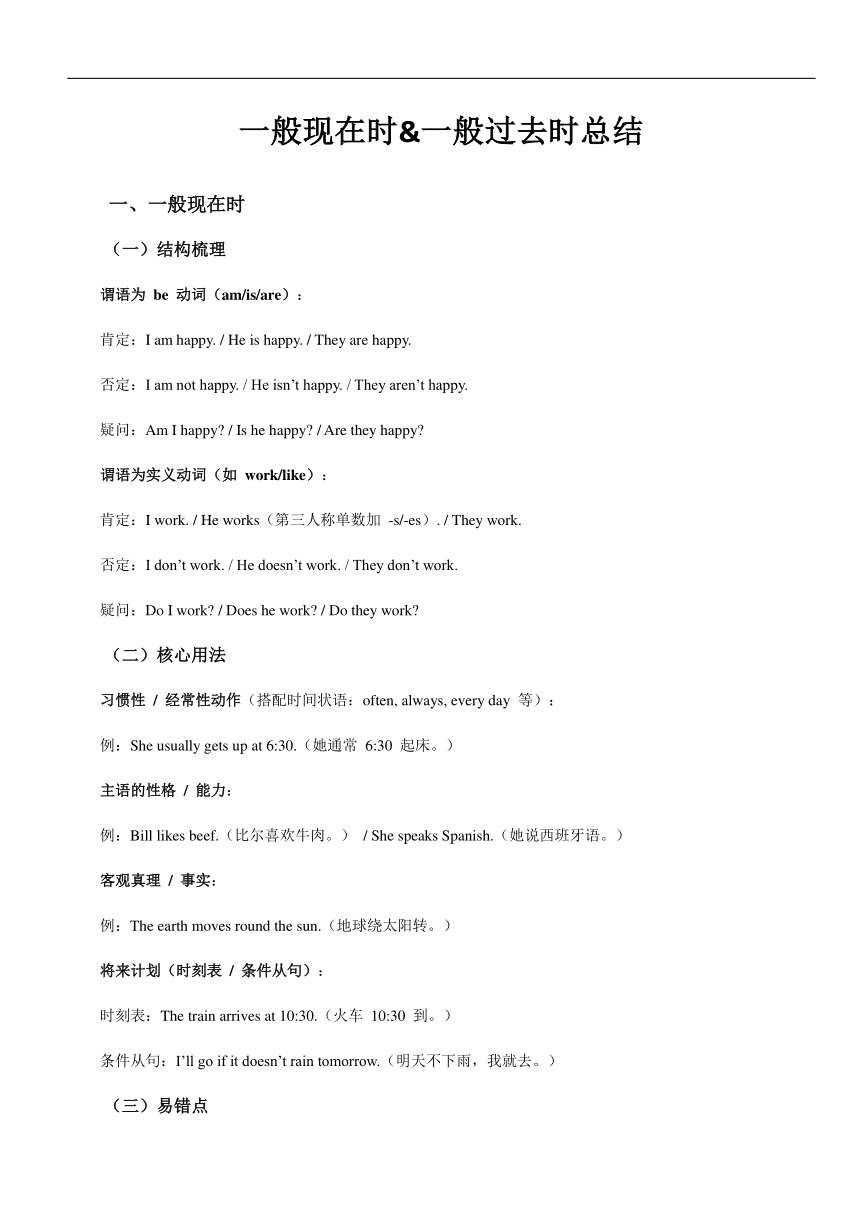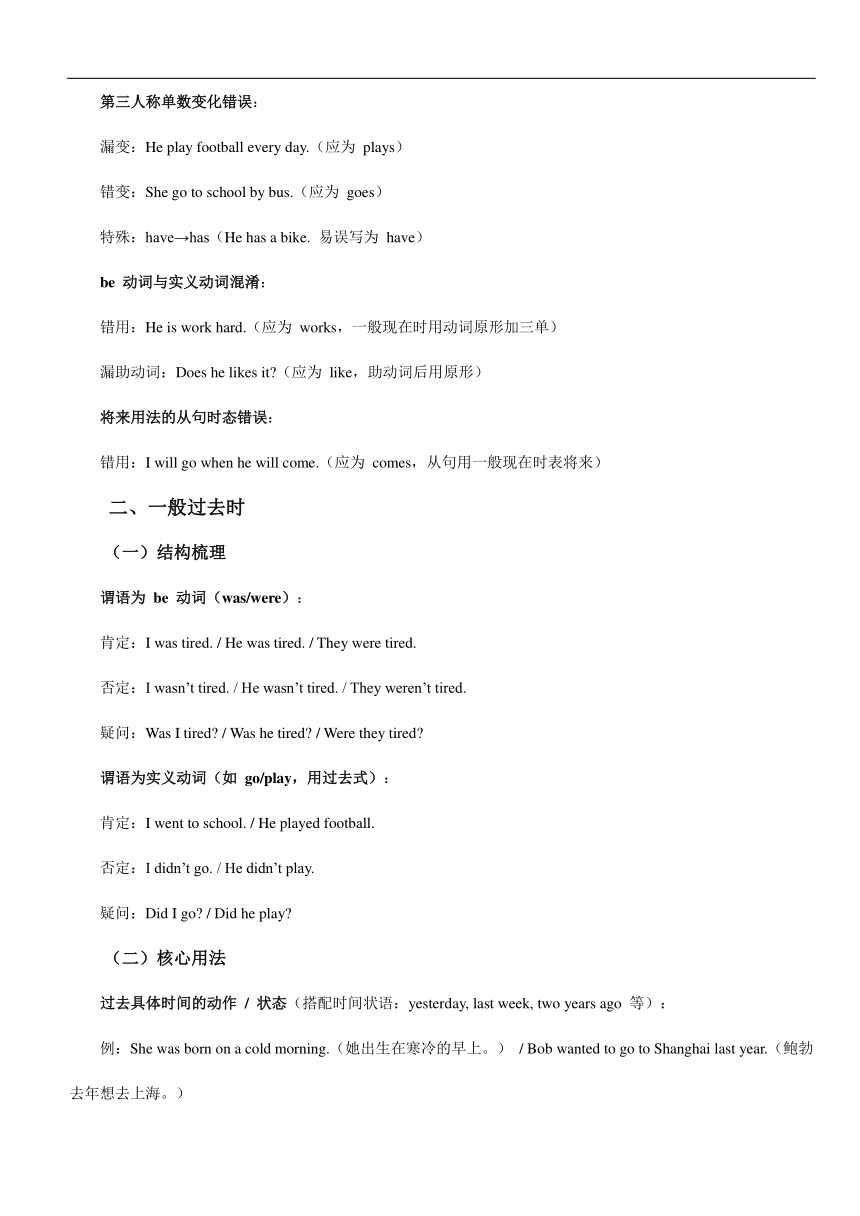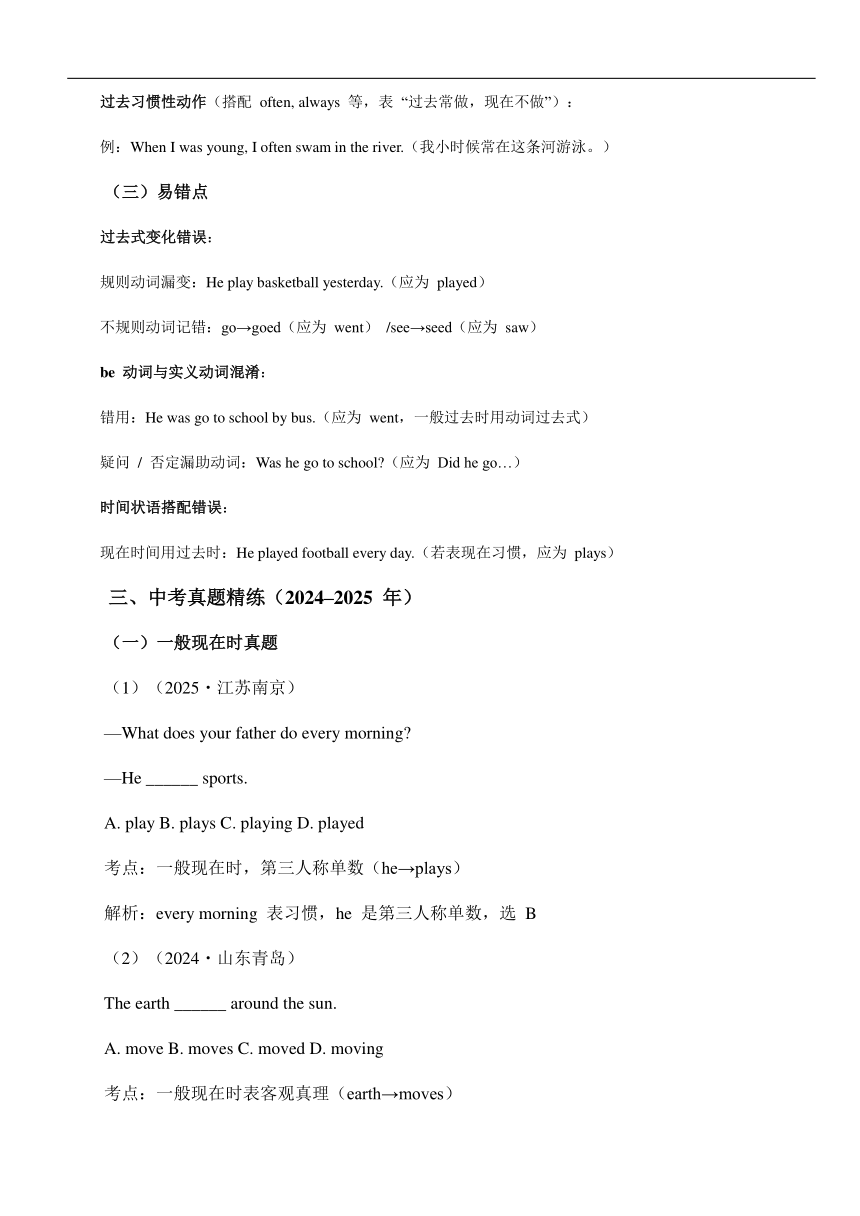2026年人教版中考英语复习知识梳理--一般现在时&一般过去时总结
文档属性
| 名称 | 2026年人教版中考英语复习知识梳理--一般现在时&一般过去时总结 |

|
|
| 格式 | docx | ||
| 文件大小 | 23.5KB | ||
| 资源类型 | 教案 | ||
| 版本资源 | 人教版 | ||
| 科目 | 英语 | ||
| 更新时间 | 2025-08-12 14:14:01 | ||
图片预览



文档简介
一般现在时&一般过去时总结
一、一般现在时
(一)结构梳理
谓语为 be 动词(am/is/are):
肯定:I am happy. / He is happy. / They are happy.
否定:I am not happy. / He isn’t happy. / They aren’t happy.
疑问:Am I happy / Is he happy / Are they happy
谓语为实义动词(如 work/like):
肯定:I work. / He works(第三人称单数加 -s/-es). / They work.
否定:I don’t work. / He doesn’t work. / They don’t work.
疑问:Do I work / Does he work / Do they work
(二)核心用法
习惯性 / 经常性动作(搭配时间状语:often, always, every day 等):
例:She usually gets up at 6:30.(她通常 6:30 起床。)
主语的性格 / 能力:
例:Bill likes beef.(比尔喜欢牛肉。) / She speaks Spanish.(她说西班牙语。)
客观真理 / 事实:
例:The earth moves round the sun.(地球绕太阳转。)
将来计划(时刻表 / 条件从句):
时刻表:The train arrives at 10:30.(火车 10:30 到。)
条件从句:I’ll go if it doesn’t rain tomorrow.(明天不下雨,我就去。)
(三)易错点
第三人称单数变化错误:
漏变:He play football every day.(应为 plays)
错变:She go to school by bus.(应为 goes)
特殊:have→has(He has a bike. 易误写为 have)
be 动词与实义动词混淆:
错用:He is work hard.(应为 works,一般现在时用动词原形加三单)
漏助动词:Does he likes it (应为 like,助动词后用原形)
将来用法的从句时态错误:
错用:I will go when he will come.(应为 comes,从句用一般现在时表将来)
二、一般过去时
(一)结构梳理
谓语为 be 动词(was/were):
肯定:I was tired. / He was tired. / They were tired.
否定:I wasn’t tired. / He wasn’t tired. / They weren’t tired.
疑问:Was I tired / Was he tired / Were they tired
谓语为实义动词(如 go/play,用过去式):
肯定:I went to school. / He played football.
否定:I didn’t go. / He didn’t play.
疑问:Did I go / Did he play
(二)核心用法
过去具体时间的动作 / 状态(搭配时间状语:yesterday, last week, two years ago 等):
例:She was born on a cold morning.(她出生在寒冷的早上。) / Bob wanted to go to Shanghai last year.(鲍勃去年想去上海。)
过去习惯性动作(搭配 often, always 等,表 “过去常做,现在不做”):
例:When I was young, I often swam in the river.(我小时候常在这条河游泳。)
(三)易错点
过去式变化错误:
规则动词漏变:He play basketball yesterday.(应为 played)
不规则动词记错:go→goed(应为 went) /see→seed(应为 saw)
be 动词与实义动词混淆:
错用:He was go to school by bus.(应为 went,一般过去时用动词过去式)
疑问 / 否定漏助动词:Was he go to school (应为 Did he go…)
时间状语搭配错误:
现在时间用过去时:He played football every day.(若表现在习惯,应为 plays)
三、中考真题精练(2024–2025 年)
(一)一般现在时真题
(1)(2025 江苏南京)
—What does your father do every morning
—He ______ sports.
A. play B. plays C. playing D. played
考点:一般现在时,第三人称单数(he→plays)
解析:every morning 表习惯,he 是第三人称单数,选 B
(2)(2024 山东青岛)
The earth ______ around the sun.
A. move B. moves C. moved D. moving
考点:一般现在时表客观真理(earth→moves)
解析:真理用一般现在时,earth 是第三人称单数,选 B
(3)(2025 浙江杭州)
If it ______ tomorrow, we’ll stay at home.
A. rain B. rains C. rained D. will rain
考点:条件从句 “主将从现”(it→rains)
解析:if 从句用一般现在时表将来,it 是第三人称单数,选 B
(二)一般过去时真题
(4)(2024 广东广州)
—Did you ______ to the park yesterday
—Yes, I had a good time.
A. go B. went C. goes D. going
考点:一般过去时,助动词 did 后接原形(go)
解析:did 后用动词原形,选 A
(5)(2025 湖北武汉)
She ______ a new bike last week.
A. buy B. buys C. bought D. buying
考点:一般过去时,实义动词过去式(buy→bought)
解析:last week 表过去,buy 的过去式是 bought,选 C
(6)(2024 四川成都)
—______ you at home yesterday
—No, I went to the library.
A. Are B. Were C. Was D. Is
考点:一般过去时,be 动词的过去式(you→were)
解析:yesterday 表过去,you 搭配 were,选 B
(三)综合语法填空
(7)(2025 福建福州)
My sister usually ______(get)up at 7:00. But yesterday she ______(get)up at 8:00 because it was Sunday.
考点:一般现在时(usually→gets)+ 一般过去时(yesterday→got)
答案:gets;got
(8)(2024 湖南长沙)
If it ______(not rain)tomorrow, we ______(have)a picnic.
考点:条件从句 “主将从现”(rain→doesn’t rain;have→will have)
答案:doesn’t rain;will have
(9)(2025 浙江宁波)
He ______(go)to school by bus every day, but he ______(walk)there yesterday.
考点:一般现在时(every day→goes)+ 一般过去时(yesterday→walked)
答案:goes;walked
答案总结
(一)选择题:
(1)B;(2)B;(3)B;(4)A;(5)C;(6)B
(二)语法填空:
(7)gets;got
(8)doesn’t rain;will have
(9)goes;walked
一、一般现在时
(一)结构梳理
谓语为 be 动词(am/is/are):
肯定:I am happy. / He is happy. / They are happy.
否定:I am not happy. / He isn’t happy. / They aren’t happy.
疑问:Am I happy / Is he happy / Are they happy
谓语为实义动词(如 work/like):
肯定:I work. / He works(第三人称单数加 -s/-es). / They work.
否定:I don’t work. / He doesn’t work. / They don’t work.
疑问:Do I work / Does he work / Do they work
(二)核心用法
习惯性 / 经常性动作(搭配时间状语:often, always, every day 等):
例:She usually gets up at 6:30.(她通常 6:30 起床。)
主语的性格 / 能力:
例:Bill likes beef.(比尔喜欢牛肉。) / She speaks Spanish.(她说西班牙语。)
客观真理 / 事实:
例:The earth moves round the sun.(地球绕太阳转。)
将来计划(时刻表 / 条件从句):
时刻表:The train arrives at 10:30.(火车 10:30 到。)
条件从句:I’ll go if it doesn’t rain tomorrow.(明天不下雨,我就去。)
(三)易错点
第三人称单数变化错误:
漏变:He play football every day.(应为 plays)
错变:She go to school by bus.(应为 goes)
特殊:have→has(He has a bike. 易误写为 have)
be 动词与实义动词混淆:
错用:He is work hard.(应为 works,一般现在时用动词原形加三单)
漏助动词:Does he likes it (应为 like,助动词后用原形)
将来用法的从句时态错误:
错用:I will go when he will come.(应为 comes,从句用一般现在时表将来)
二、一般过去时
(一)结构梳理
谓语为 be 动词(was/were):
肯定:I was tired. / He was tired. / They were tired.
否定:I wasn’t tired. / He wasn’t tired. / They weren’t tired.
疑问:Was I tired / Was he tired / Were they tired
谓语为实义动词(如 go/play,用过去式):
肯定:I went to school. / He played football.
否定:I didn’t go. / He didn’t play.
疑问:Did I go / Did he play
(二)核心用法
过去具体时间的动作 / 状态(搭配时间状语:yesterday, last week, two years ago 等):
例:She was born on a cold morning.(她出生在寒冷的早上。) / Bob wanted to go to Shanghai last year.(鲍勃去年想去上海。)
过去习惯性动作(搭配 often, always 等,表 “过去常做,现在不做”):
例:When I was young, I often swam in the river.(我小时候常在这条河游泳。)
(三)易错点
过去式变化错误:
规则动词漏变:He play basketball yesterday.(应为 played)
不规则动词记错:go→goed(应为 went) /see→seed(应为 saw)
be 动词与实义动词混淆:
错用:He was go to school by bus.(应为 went,一般过去时用动词过去式)
疑问 / 否定漏助动词:Was he go to school (应为 Did he go…)
时间状语搭配错误:
现在时间用过去时:He played football every day.(若表现在习惯,应为 plays)
三、中考真题精练(2024–2025 年)
(一)一般现在时真题
(1)(2025 江苏南京)
—What does your father do every morning
—He ______ sports.
A. play B. plays C. playing D. played
考点:一般现在时,第三人称单数(he→plays)
解析:every morning 表习惯,he 是第三人称单数,选 B
(2)(2024 山东青岛)
The earth ______ around the sun.
A. move B. moves C. moved D. moving
考点:一般现在时表客观真理(earth→moves)
解析:真理用一般现在时,earth 是第三人称单数,选 B
(3)(2025 浙江杭州)
If it ______ tomorrow, we’ll stay at home.
A. rain B. rains C. rained D. will rain
考点:条件从句 “主将从现”(it→rains)
解析:if 从句用一般现在时表将来,it 是第三人称单数,选 B
(二)一般过去时真题
(4)(2024 广东广州)
—Did you ______ to the park yesterday
—Yes, I had a good time.
A. go B. went C. goes D. going
考点:一般过去时,助动词 did 后接原形(go)
解析:did 后用动词原形,选 A
(5)(2025 湖北武汉)
She ______ a new bike last week.
A. buy B. buys C. bought D. buying
考点:一般过去时,实义动词过去式(buy→bought)
解析:last week 表过去,buy 的过去式是 bought,选 C
(6)(2024 四川成都)
—______ you at home yesterday
—No, I went to the library.
A. Are B. Were C. Was D. Is
考点:一般过去时,be 动词的过去式(you→were)
解析:yesterday 表过去,you 搭配 were,选 B
(三)综合语法填空
(7)(2025 福建福州)
My sister usually ______(get)up at 7:00. But yesterday she ______(get)up at 8:00 because it was Sunday.
考点:一般现在时(usually→gets)+ 一般过去时(yesterday→got)
答案:gets;got
(8)(2024 湖南长沙)
If it ______(not rain)tomorrow, we ______(have)a picnic.
考点:条件从句 “主将从现”(rain→doesn’t rain;have→will have)
答案:doesn’t rain;will have
(9)(2025 浙江宁波)
He ______(go)to school by bus every day, but he ______(walk)there yesterday.
考点:一般现在时(every day→goes)+ 一般过去时(yesterday→walked)
答案:goes;walked
答案总结
(一)选择题:
(1)B;(2)B;(3)B;(4)A;(5)C;(6)B
(二)语法填空:
(7)gets;got
(8)doesn’t rain;will have
(9)goes;walked
